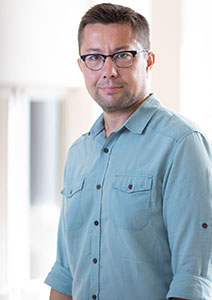Erman Ayday focuses on ensuring privacy protections for people whose genomic information is stored among a global collection of personal data
(This story is one of several about 2022 winners of the NSF CAREER award at Case Western Reserve University.)
Erman Ayday, assistant professor of computer and data sciences at Case Western Reserve University, has won a National Science Foundation (NSF) Faculty Early Career Development Program (CAREER) grant.
The CAREER award is considered the agency’s most significant grant for junior faculty members whom NSF believes “have the potential to serve as academic role models in research and education and to lead advances in the mission of their department or organization.”

The new five-year, $500,000 grant will support Ayday’s ongoing work to identify, analyze and mitigate privacy vulnerabilities for individuals who share their genomic information with institutions, which then share the data with wider genomic databases.
Personal genomic data refers to each person’s unique genome, his or her genetic makeup and information that can be gleaned from DNA analysis of a blood test or saliva sample.
Scientists around the world rely on a network of individualized-but-anonymous genomic information to research cancer, Alzheimer’s and other diseases.
The problem, Ayday said, is that the private data doesn’t always stay that way.
“There are already some real-world examples of people accessing the data related to genomic databases in such a way that they can find out the identity of a specific person—and everything about them from a genomic point of view,” Ayday said. “This could mean their racial background, their predisposition to certain diseases and so on, even the identity of their father, for example.”
Finding, patching holes
Ayday and other researchers, then, work on finding vulnerabilities in genomic data sharing platforms and then patching them.
“This is not all that different from the privacy protections you might set for yourself on social media—but it’s also very different because the value of the data is much higher,” he said. “You don’t want genomic data to get in the hands of parties that shouldn’t have it.”
Ayday, who joined CWRU in 2018, plans to identify weaknesses in sharing genomic databases in different settings and develop more complex algorithms to protect against people or organizations who share his ability to figure out one person’s identity or sensitive genomic information.
On the other hand, Ayday said, being able to access personalized data can help people get individualized medical treatment.
“The new science of health care is for people to get customized treatment, and your genomic data is a big part of that,” he said. “But you want to be able to be the one who controls who gets that data.”
In collaboration with Cleveland Institute for Computational Biology, Ayday also plans to implement the developed algorithms in real-life settings.
The National Institutes of Health awarded Ayday a four-year, $1.2 million grant in 2020 for related work in shoring up privacy protections for people whose genomic information is stored in databases known as “the Beacons.”
And this year, the NSF awarded a four-year $500,000 grant to Ayday and collaborator Emre Yilmaz to study the privacy and liability issues while sharing relational databases, including those that store genomic information. Yilmaz is an assistant professor in the Department of Computer Science and Engineering Technology at the University of Houston-Downtown and former research associate at Case Western Reserve.
For more information, contact Mike Scott at mike.scott@case.edu.

